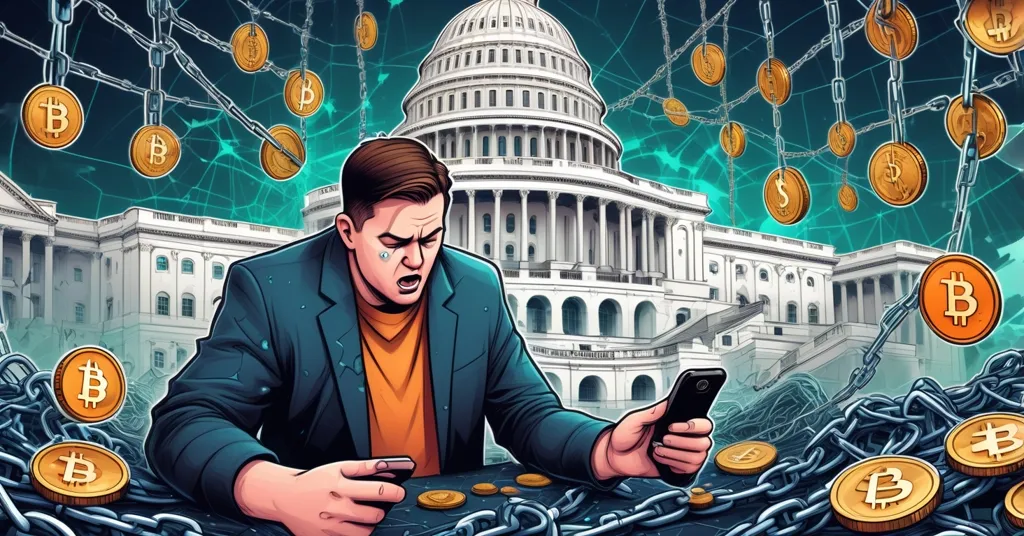U.S. Crypto Regulation Crisis: DeFi Rules, Stablecoin Risks, and Coinbase Blunders in 2023

U.S. Crypto Regulation Chaos: DeFi, Stablecoins, and Coinbase Stumbles in 2023
The U.S. digital asset sector is stuck in a quagmire of regulatory uncertainty, legislative incompetence, and operational blunders that could make even the most die-hard Bitcoin bull question the road ahead. From Senate gridlock over DeFi oversight to risky stablecoin laws and Coinbase’s latest facepalm-worthy decisions, the path to mainstream crypto adoption feels like navigating a minefield blindfolded. Let’s break down the mess and see if there’s any hope for a freer, decentralized financial future amidst the rubble.
- Senate Standoff: Blockchain CEOs clash with Democrats over DeFi rules as partisan divides and a government shutdown grind progress to a halt.
- Stablecoin Snares: The GENIUS Act draws criticism for reserve asset risks and regulatory loopholes that could destabilize markets.
- Tokenization Tensions: SEC pushes innovation, but blockchain firms resist TradFi giants like Nasdaq gaining an unfair edge.
- Coinbase Calamity: Platform outages and a $25M NFT splurge by CEO Brian Armstrong ignite user fury amid trust issues.
Senate Stalemate on Crypto Legislation: A Clueless Committee
On October 22, a high-stakes roundtable saw Senate Democrats, spearheaded by Senator Kirsten Gillibrand (D-NY), face off with CEOs from crypto heavyweights like Coinbase, Kraken, Galaxy Digital, Chainlink, Uniswap, Ripple Labs, and Circle. The hot topic was a digital asset market structure bill, with a leaked six-page proposal from October 9 setting the industry on edge. This document demands strict oversight of decentralized finance (DeFi) platforms, requiring them to enforce Know Your Customer (KYC) and Anti-Money Laundering (AML) rules. For those new to the space, DeFi refers to blockchain-based financial systems—think lending or trading without banks—that thrive on anonymity and user autonomy. Labeling DeFi operators as “digital asset intermediaries” who must register with federal authorities feels like a gut punch to the very ethos of decentralization. It’s not just oversight; it’s a potential death knell for privacy-focused innovation.
What does this mean in practice? Beyond collecting personal data (goodbye, pseudonymity), non-compliant platforms could face fines, forced shutdowns, or even mandatory smart contract audits—costly measures that could choke smaller projects. History tells us this isn’t far-fetched; countless crypto ventures fled U.S. jurisdiction during the SEC’s crackdown under Gary Gensler, seeking refuge in places like Singapore or Switzerland. If passed, this proposal might push DeFi underground or overseas, leaving American users with neutered versions of what was once a borderless financial revolution. The ongoing struggle to define a clear regulatory path is evident as the U.S. digital asset market structure road just keeps getting bumpier.
The Senate Banking Committee, responsible for shaping this bill, is in utter disarray. GOP Senator John Kennedy (R-LA) laid it bare on October 14 with a scathing assessment of his colleagues’ readiness for a markup—a session where committee members debate and amend a bill before voting.
“We’re not ready to mark this bill up—not even close. Nobody on the committee understands it. I think a majority of the members of the committee have no idea what’s in the bill.”
A planned markup for September 30 got pushed back, and with a government shutdown dragging into its fourth week, any chance of a Senate vote before the December holiday recess is slimmer than a paper wallet. To make matters worse, the Senate Agriculture Committee, tasked with drafting related language for the Commodity Futures Trading Commission (CFTC) to oversee most digital assets, hasn’t even started. This isn’t just Washington gridlock; it’s a masterclass in bureaucratic incompetence. Crypto literacy among lawmakers is as outdated as dial-up internet, turning a potentially transformative framework into a political dumpster fire. The longer this drags, the more regulatory gaps widen—paving the way for the very risks these laws claim to address.
Stablecoin Risks Under the GENIUS Act: A Ticking Time Bomb?
While legislative wheels spin in mud, the recently signed GENIUS Act—a stablecoin regulation law endorsed by President Donald Trump this summer—is already raising alarms. Stablecoins, for the unversed, are cryptocurrencies designed to hold a steady value, often pegged to the U.S. dollar like USDC, USDT, or DAI, making them crucial for trading and payments in volatile crypto markets. Yet U.S. banks are up in arms over loopholes in the Act that allow crypto firms to offer “rewards” on stablecoins, sidestepping yield restrictions that bind traditional finance. It’s a competitive edge that could siphon deposits from banks, and they’re not happy about it.
More concerning are the systemic risks flagged by Federal Reserve Governor Michael Barr during his speech at D.C. Fintech Week on October 16. His warnings cut to the heart of stablecoin stability.
“Until quite recently, El Salvador treated Bitcoin as legal tender … as a result, an issuer could argue that Bitcoin repo could qualify as an eligible reserve asset for a stablecoin.”
“Stretching the boundaries of permissible reserve assets can increase profits in good times but risks a crack in confidence during inevitable bouts of market stress.”
Let’s unpack this. A “repo agreement” is a short-term loan common in finance, but here it involves using Bitcoin as collateral—a wildly volatile asset. If a stablecoin issuer backs their token with such risky mechanisms, a market downturn could shatter the peg, leaving users holding worthless digital IOUs. Remember TerraUSD’s catastrophic collapse in 2022? A $40 billion implosion wiped out savings overnight due to flawed reserve design. Barr also highlighted “regulatory arbitrage”—exploiting differences in rules between overseeing agencies to skirt accountability. With multiple bodies like the Fed, SEC, and state regulators in the mix, who ensures consistency? The average user might not grasp these nuances, but they’ll feel the pain if a stablecoin they trusted as “safe” turns out to be a house of cards.
This isn’t just theory; it’s a confidence crisis waiting to erupt. Stablecoins handle over $150 billion in market cap (per CoinMarketCap data), acting as the backbone of crypto trading. A crack in that foundation could ripple across markets, reinforcing skeptics who call crypto a speculative bubble. Until these reserve rules are tightened, the GENIUS Act might be less genius and more gamble.
Tokenization Tug-of-War: Innovation or Inequality?
Shifting gears, the SEC under Chair Paul Atkins is taking a surprisingly pro-crypto stance compared to the Gensler era’s iron grip. At D.C. Fintech Week, Atkins positioned tokenization—converting real-world assets like real estate or art into digital tokens on a blockchain—as a top priority.
“Crypto and tokenization are now ‘job one’ for the SEC, which plans to be very forward-leaning in that in order to accommodate new ideas.”
He’s even proposing an “innovation exemption” by year-end for initial coin offerings (ICOs), airdrops, and network rewards, potentially loosening the regulatory stranglehold that’s pushed projects offshore. Tokenization could democratize investing—imagine owning a fraction of a Manhattan condo for $100 via Ethereum-based tokens. It’s a game-changer for retail investors, opening doors to assets previously locked behind wealth barriers.
But before we pop the champagne, not everyone’s on board. Blockchain firm Ondo Finance sent an open letter to the SEC, urging a delay on Nasdaq’s application to trade tokenized equities and ETFs alongside traditional ones. Their concern is stark: traditional finance (TradFi) giants like Nasdaq have unequal access to critical information and infrastructure. Specifically, the Depository Trust Company (DTC), a central clearinghouse for U.S. securities, is reportedly developing blockchain-based transaction systems. If TradFi gets a head start, crypto-native firms could be left in the dust, creating a lopsided market where Wall Street rigs the game—again. Beyond this, tokenization carries risks like cybersecurity flaws (hacked smart contracts, anyone?) and legal gray areas over digital ownership rights. Atkins’ optimism is refreshing, but rushing integration without addressing these gaps could backfire, entrenching inequality rather than disrupting it.
Coinbase in Crisis: Outages and a Tone-Deaf $25M NFT Buy
Amidst regulatory chaos, Coinbase, a flagship U.S. crypto exchange, keeps tripping over its own feet. A recent Monday outage, triggered by an Amazon Web Services (AWS) glitch, left users stranded during a volatile market window—hardly a first for Coinbase, which has a track record of crumbling under pressure. Social media erupted with frustration, with countless traders unable to access funds or execute trades when seconds mattered. One anonymous X post summed up the vibe: “Coinbase down again during a pump. Might as well use a potato as my exchange.” Reliability isn’t a nice-to-have in crypto; it’s the bare minimum.
So, what does CEO Brian Armstrong do while his platform’s burning? He drops a cool $25 million on an NFT from trader Cobie (Jordan Fish), who plans to revive his Up Only TV podcast with the windfall. Non-fungible tokens (NFTs) are unique digital assets verified on blockchains, often tied to art or collectibles, but let’s be real—$25 million for a digital trinket while your users are screaming about downtime is a PR disaster. The optics are beyond atrocious; they’re borderline insulting. Coinbase’s mission is to be a trusted gateway to crypto, yet this flashy splurge screams misplaced priorities. Shouldn’t those millions go toward beefing up servers or compensating users for losses during outages? This isn’t just a Coinbase problem—it erodes trust in centralized exchanges at a time when the industry’s already under a regulatory microscope. If you can’t handle the basics, don’t flex with speculative toys.
A Messy Revolution: Can Bitcoin and Blockchain Prevail?
Zooming out, the U.S. crypto landscape in 2023 is a fragmented hellscape. Lawmakers bicker while lacking the faintest grasp of blockchain tech. Stablecoin laws like the GENIUS Act risk catastrophic flaws if markets turn south. The SEC’s tokenization push pits blockchain innovators against TradFi behemoths in a battle for control. And Coinbase’s operational fumbles, paired with tone-deaf spending, highlight how even industry leaders can undermine public confidence. Yet, amidst this dumpster fire, there’s a flicker of stubborn hope. Bitcoin and blockchain represent a radical break from centralized, opaque financial systems—a chance to rebuild on principles of decentralization, privacy, and individual freedom.
As a Bitcoin maximalist at heart, I can’t help but see regulatory overreach as a perverse kind of validation. The more governments flail to control altcoins, stablecoins, and DeFi, the stronger Bitcoin’s case becomes as the unassailable store of value—no permission needed, no middleman to screw you over. That said, I’m not blind to the niches others fill; Ethereum’s smart contracts power tokenization, and stablecoins ease trading friction Bitcoin can’t match. Every protocol has a role in this financial uprising, even if some are more distraction than solution.
Call it effective accelerationism (e/acc): we must push the tech forward, chaos be damned, because the status quo of bloated banks and surveillance finance is worth dismantling. But let’s not ignore the cracks in our own foundation. These regulatory missteps and industry blunders are painful, messy phases of a broader revolution. If we want true disruption, we need less political theater, fewer half-assed laws, and a laser focus on resilient systems. Looking to 2024, will we see a breakthrough in U.S. crypto policy, or deeper fractures as global adoption outpaces sluggish frameworks? The fight for a decentralized future isn’t pretty, but it’s one worth waging.
Key Questions and Takeaways on U.S. Crypto Regulation Challenges
- What’s stalling U.S. crypto legislation in the Senate?
Partisan disputes, a staggering lack of tech savvy among Senate Banking Committee members, and a dragging government shutdown are major hurdles, with no vote expected before the year ends. - How could DeFi regulations reshape the crypto industry?
Enforcing KYC and AML rules threatens to gut DeFi’s decentralized core, inflate costs, and drive projects overseas or underground, alienating privacy-focused users who value autonomy. - What dangers does the GENIUS Act hold for stablecoins?
As Fed Governor Barr cautions, risky reserve assets like Bitcoin repo deals and regulatory gaps between agencies could shatter trust in stablecoins during market stress, risking systemic fallout. - Why the conflict over tokenization between blockchain firms and TradFi?
Firms like Ondo Finance fear TradFi giants like Nasdaq will dominate tokenized asset markets with better access to infrastructure, potentially marginalizing crypto-native players in the race for innovation. - Is Coinbase’s $25M NFT purchase defensible amid platform outages?
Hell no—users are rightfully enraged as frequent downtimes undermine reliability, making such a lavish, speculative spend look utterly tone-deaf and a slap in the face to customer needs. - Can Bitcoin and blockchain thrive despite U.S. regulatory chaos?
Absolutely. Global adoption and community resilience keep Bitcoin strong as a decentralized refuge, while blockchain innovation often outruns slow, flawed regulatory systems, proving the tech’s enduring potential.



